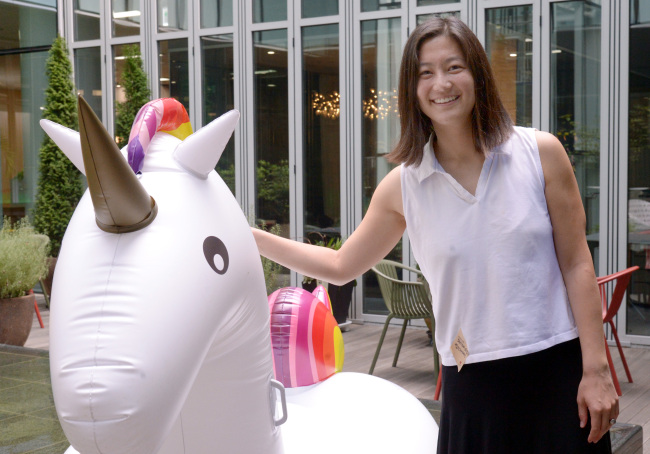[INTERVIEW] 500 Startups hunts for next unicorn in global market
By Kim Young-wonPublished : Aug. 18, 2016 - 13:46
The startup accelerator program, held four times a year at two of 500’s offices in Mountain View and San Francisco, is a mixture of collaboration as well as fierce competition among startups from around the world. Mentors, called coaches there, also provide full support in a range of sectors, such as marketing and sales, for the participants.
“The two accelerators under the startup nurturing firm -- dubbed Mountain View and San Francisco -- help companies immediately get connected with influential people, and in many cases it is surprising to people as they find out how helpful people are immediately even if they don’t know you and how helpful people are in Silicon Valley,” Elizabeth Yin, the head of the Mountain View accelerator, said in an interview with The Korea Herald/The Investor in Seoul on Tuesday.
“But also at the same time it is very competitive, and that competition actually urges people to move faster,” said Yin, a startup veteran who keeps several venture failures under her belt.

She founded and ran five startups as side projects before joining 500, and most of them fell short of success except for ad tech firm LaunchBit, which she sold to an ad platform operator in 2014.
The accelerator chief, also called a 500 Startups partner at the firm, pointed out that being unable to find out the precise need of customers was the primary reason for the past failures
“(Now) I recommend founders that they start talking with customers now before even they have a product,” she said.
Success recipe
500 Startups describes its programs and services as being like secret recipes for fledgling startups around the globe to survive the stiff competition in the global startup scene and become the next “unicorn” – a venture firm that grows to be worth $1 billion or more.
Among the recipes offered by the startup nurturing firm, a mix of criticism and harsh words being hurled from every direction during their pitches in 500’s programs are well known to Silicon Valley venture capitals and startups.
“The participants of the 500 Startups programs go to the rooms of the office and do their pitches and Dave McClure (founder of 500 Startups) will just yell at them in the back like ‘I can’t hear you,’ or ‘Louder’” Yin said.
She said McClure’s sometimes acid comments about the startups often serve as a wake-up call for those companies, which may have been in the top their local ecosystems, helping them realize that they are just one of many in Silicon Valley.
Receiving criticism and advice from mentors and a full range of support, the participants of the 500’s program are ultimately forced to work harder and faster than ever before, according to Yin.

One of the 500 program’s biggest perks is the network it provides, she said.
“If you wanted to get the same network offered by 500, you would probably have to fly to Silicon Valley, live there for probably a year and network like crazy in order to accomplish the same thing as you can in our program for four months,”
The company has invested more than 1,600 companies since July 2010 and it has more than $250 million in assets under management.
It runs four main funds, 10 regional funds, and more than two vertical funds, including those for fintech and mobile, and has two accelerators.
Unlike the traditional approach to investing in startups — pouring a chunk of money into a few promising start-ups -- 500 puts its eggs in many different baskets by making “lots of little bets,” in many companies in their early and mid-stages.
“Identifying winners in the early stages is difficult, and this difficulty is the basis for our investment thesis in having a large portfolio,” the company said.
According to the data provided by the firm, only 1 in 100 startups has a potential to become a unicorn, and the rate is becoming lower as competition gets fiercer. So diversifying bets also increases the odds of hitting the jackpot while reducing risks.
Some of the big wins of 500 include Twilio, which went public on June 23, raising $150 million, and SendGrid, an email services provider which has generated more than $60 million in revenue last year and is expected to go public next year.
McClure, a former PayPal executive, said in a media interview that he anticipated three to five large startup exits such as an initial public offering down the road.
The seed fund also tries to put more weight on investing in international startups rather than focusing on Silicon Valley-based firms.
More than a third of the startups in 500’s programs are from global markets, including South Korea and Japan.
The startup seed investor’s initial investment scheme is that it invests $125,000 in each startup, from which it deducts $25,000 as program fees, and in return obtains 5 to 10 percent of the company. The company said, however, it would change its terms this month. The fee is expected to rise due to an increase in the operational costs of the company.
By Kim Young-won (wone0102@heraldcorp.com)







![[From the Scene] Monks, Buddhists hail return of remains of Buddhas](http://res.heraldm.com/phpwas/restmb_idxmake.php?idx=644&simg=/content/image/2024/04/19/20240419050617_0.jpg&u=20240419175937)







![[From the Scene] Monks, Buddhists hail return of remains of Buddhas](http://res.heraldm.com/phpwas/restmb_idxmake.php?idx=652&simg=/content/image/2024/04/19/20240419050617_0.jpg&u=20240419175937)

![[KH Explains] Hyundai's full hybrid edge to pay off amid slow transition to pure EVs](http://res.heraldm.com/phpwas/restmb_idxmake.php?idx=652&simg=/content/image/2024/04/18/20240418050645_0.jpg&u=20240419100350)

![[Today’s K-pop] Illit drops debut single remix](http://res.heraldm.com/phpwas/restmb_idxmake.php?idx=642&simg=/content/image/2024/04/19/20240419050612_0.jpg&u=)